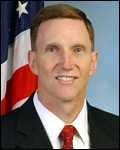Matter May Be Moot, As Pistole Says He Can Authorize Collective
Bargaining ... Up To A Point
 The American Federation of
Government Employees on Thursday urged Senators to vote against an
amendment to the FAA Authorization bill sponsored by Sen. Roger
Wicker (R-MS), named the Termination of Collective Bargaining for
Transportation Security Administration Employees Act, which would
prevent more than 40,000 Transportation Security Officers from
joining the union and remove others from union rolls.
The American Federation of
Government Employees on Thursday urged Senators to vote against an
amendment to the FAA Authorization bill sponsored by Sen. Roger
Wicker (R-MS), named the Termination of Collective Bargaining for
Transportation Security Administration Employees Act, which would
prevent more than 40,000 Transportation Security Officers from
joining the union and remove others from union rolls.
The online site Security Info Watch reports that Wicker
defended his amendment, saying security requires a great deal of
flexibility in how assets are deployed. "The FBI, the CIA, and the
Secret Service do not have collective bargaining for a good
reason," Wicker said.
 AFGE National President John Gage
issued the following statement:
AFGE National President John Gage
issued the following statement:
"The Wicker amendment does not strengthen homeland security, as
he would have you believe. There is no evidence that collective
bargaining rights have any negative impact on national security,
nor that these rights undermine the ability of TSA or any other
Department of Homeland Security employees to perform their
duties.
"Collective bargaining is in fact a benefit for national
security because it empowers workers to voice opinions and make
suggestions without fear of retribution. Through fair and
consistent working conditions negotiated in a collective bargaining
agreement, the workforce becomes more stable and has lower
turnover—currently a huge issue at TSA. Furthermore, private
passenger and baggage screeners at San Francisco Airport performing
the same duties as TSOs have had the right to bargain collectively
for years, and have done so with promise.
"TSOs work side-by-side with hundreds of thousands of their DHS
colleagues in the Border Patrol, Immigration and Customs
Enforcement, Federal Protective Service, Coast Guard and FEMA who
have collective bargaining rights. It is an affront to the
professionalism and integrity of TSA employees to insinuate that
they would not do their jobs to the best of their ability because
of a bargaining agreement. Further, the assertion that a collective
bargaining agreement would mean that unionized workers could not be
disciplined is untrue—federal law governs the agency's
authority to hire, direct, layoff, suspend, remove, and assign
work. Additionally, the law bans federal employees from
striking.
"This country's TSOs are unequivocally dedicated to protecting
each and every American, just like the unionized police and
firefighters who valiantly ran into the burning buildings on 9/11.
It is an absolute insult to say that with a collective bargaining
agreement, TSOs couldn't fulfill the mission of TSA, of DHS and of
the United States of America.
"AFGE encourages every senator to vote "no" to this anti-union,
anti-worker amendment."
 The matter may be moot, however, as
TSA Administrator John Pistole (pictured) said Friday
that he would allow a union to organize and bargain on behalf of
security officers, however some things would be off the table.
The matter may be moot, however, as
TSA Administrator John Pistole (pictured) said Friday
that he would allow a union to organize and bargain on behalf of
security officers, however some things would be off the table.
The New York Times reports that Pistole said he already
has authority granted by Congress to authorize collective
bargaining, but negotiations would be limited to such workplace
issues as setting vacation priority, shift assignments, and
recognition for commendable work. Salaries and benefits would not
be subject to collective bargaining.
Security officers are also not allowed to strike, and even if a
union vote in March is successful, TSOs will not be required to
join or pay dues.
AFGE and the Treasury Employees Union are vying for exclusive
rights to represent TSOs. According to the New York Times, about
13,000 already belong to AFGE.
 ANN's Daily Aero-Linx (04.13.24)
ANN's Daily Aero-Linx (04.13.24) ANN's Daily Aero-Term (04.13.24): Beyond Visual Line Of Sight (BVLOS)
ANN's Daily Aero-Term (04.13.24): Beyond Visual Line Of Sight (BVLOS) Airborne 04.09.24: SnF24!, Piper-DeltaHawk!, Fisher Update, Junkers
Airborne 04.09.24: SnF24!, Piper-DeltaHawk!, Fisher Update, Junkers Aero-News: Quote of the Day (04.14.24)
Aero-News: Quote of the Day (04.14.24) ANN's Daily Aero-Term (04.14.24): Maximum Authorized Altitude
ANN's Daily Aero-Term (04.14.24): Maximum Authorized Altitude





